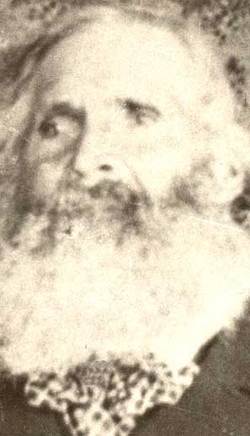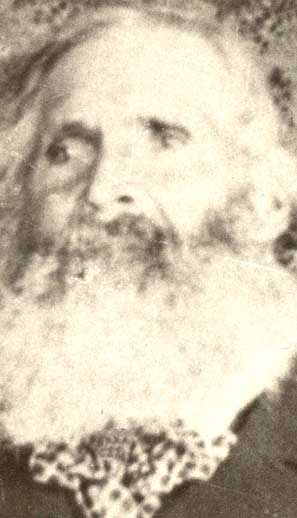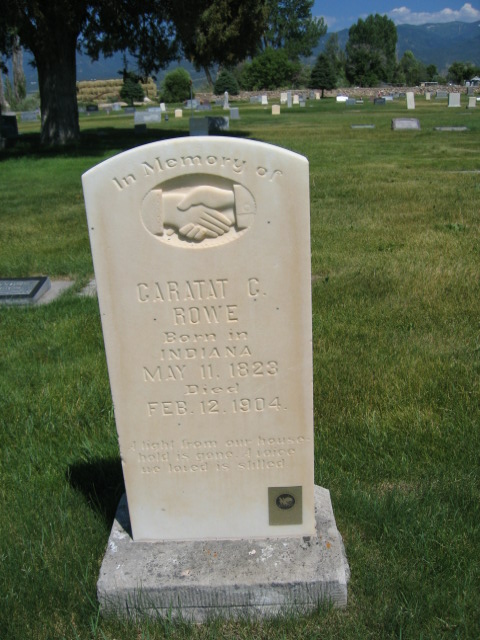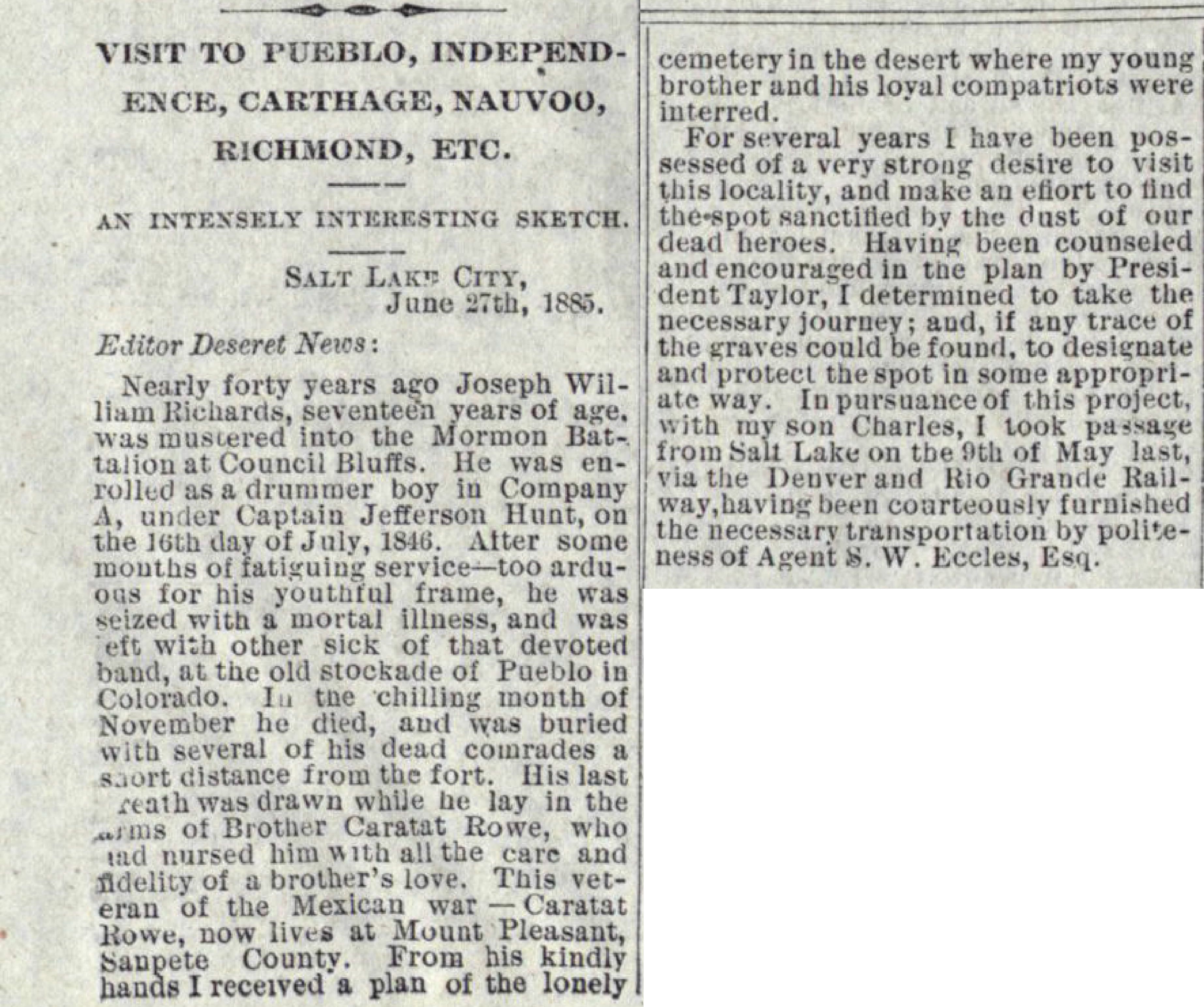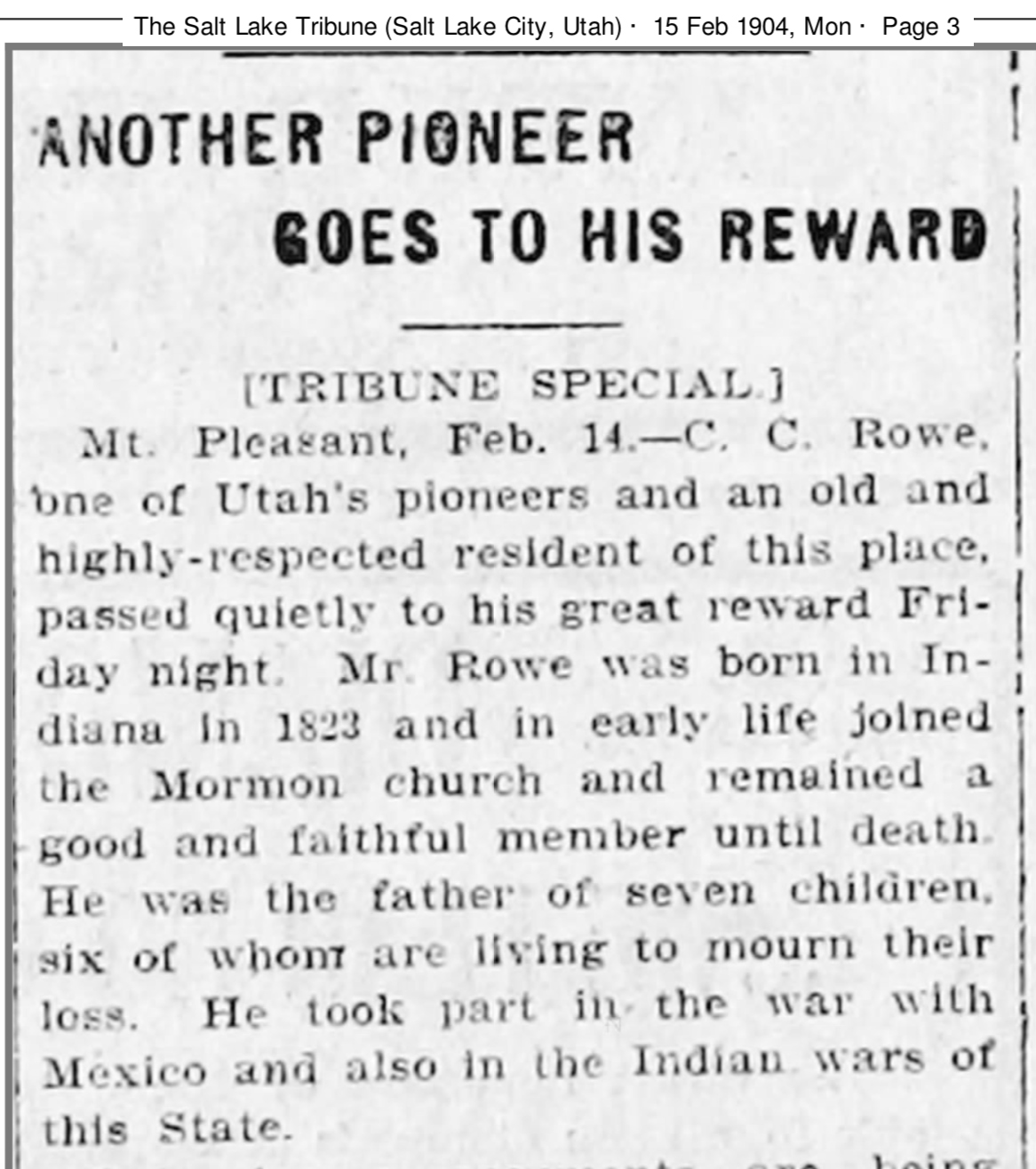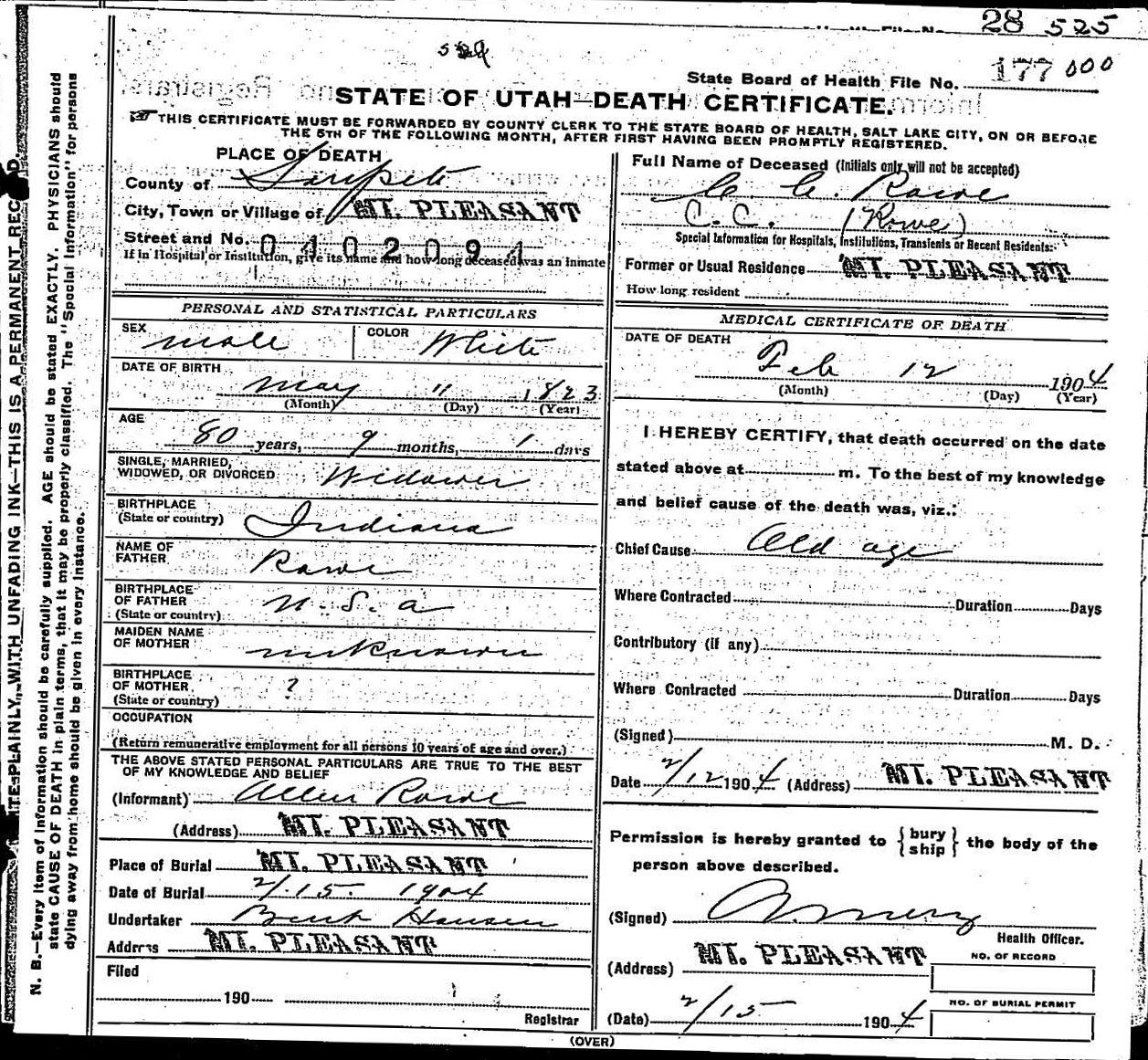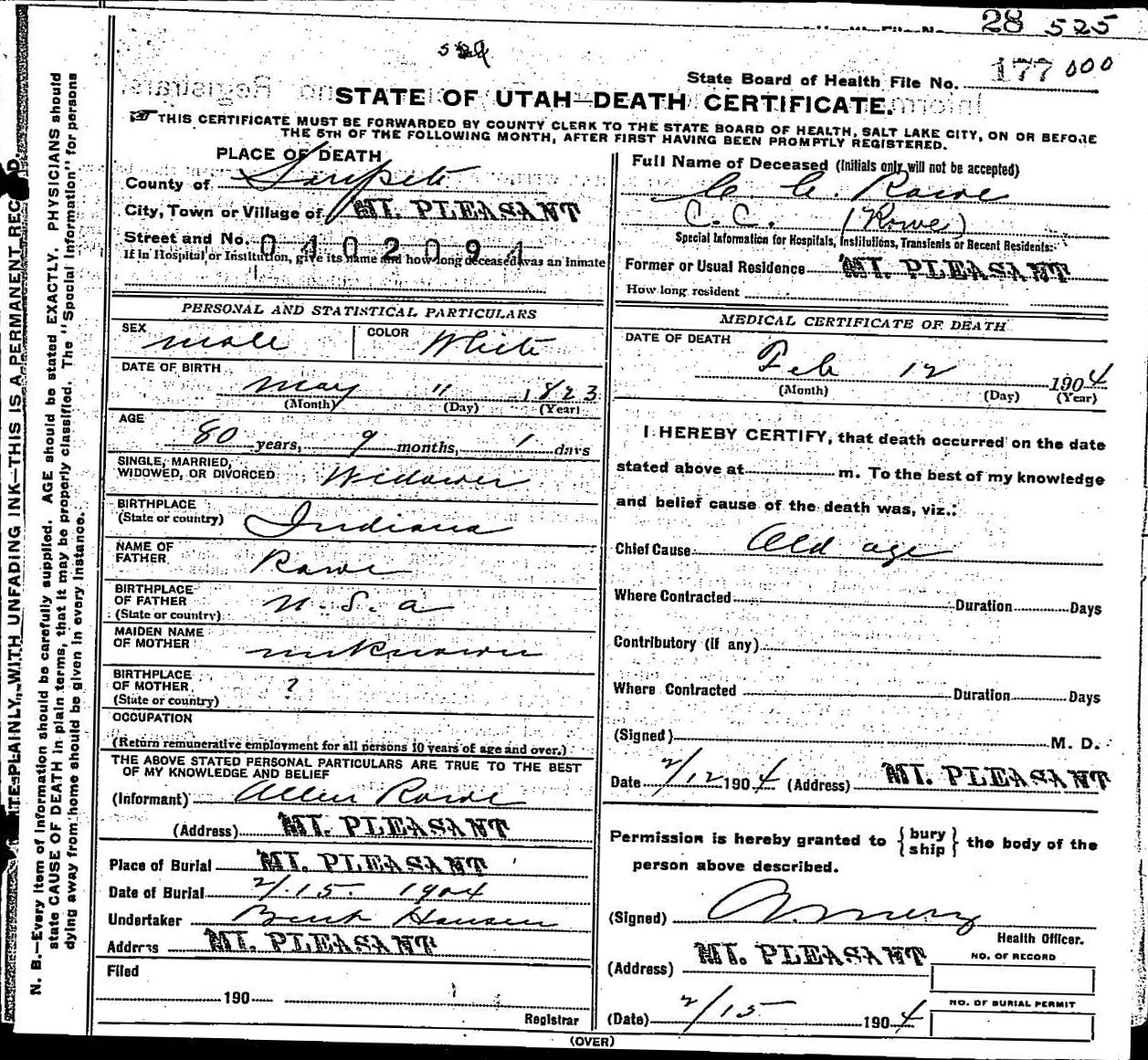Married Mary Napier, abt 1849, Utah
Caratat Conderset Rowe, a son of William Niblo Rowe and Candace Blanchard Rowe was born in Perry, Delaware County, Indiana in 1823.
When young Tat was baptized into the Church of Jesus Christ of Latter-Day Saints the family moved westward. When the Mormon Battalion was organized Tat and his brother William enlisted and he was a member of Company A.
The Rowe brothers were with the "Sick Detachment" under Captain James Brown which was compelled to winter during 1846-1847 at Pueblo, Colorado. The main body of the battalion continued in journey into California, to San Diego. Among these latter were some friends of the Rowe brothers, James, Riley, Alfred, and Reddick N. Alfred.
During the travels toward Utah, brother William Rowe became very ill and was unable to travel. He lay down on the ground and his brother Tat was tenderly watching over him. As the others of the company were passing by one of the captains said to Tat, "We must move on, it seems that your brother will live but a short time. You had better come along with us." Tat sat beside his brother, cross legged with his gun across his knees. "I am staying here," he said to the Captain. Then the Captain turned to several of his men and told them to place the dying man in the wagon. The men did so and the company moved on slowly.
The group consisted of besides Captain Brown, Captains Nelson Higgins, and William J. Willis. There were 140 of the sick detachment and 40 of the Mississippi Saints also bound for Utah. There were only 29 wagons, 1 carriage, 100 horses and mules, and 300 head of cattle to make the journey.
This company arrived in Utah just five days after the arrival of the original company on July 29, 1847. The sick were cared for by the Brothers and Sisters who had arrived there previously.
When President Brigham Young and a few companies returned to the Missouri River where the most of the Saints were, a number of the others returned with him. The Battalion Boys in Iowa from California and some of the Pueblo detachment who had recovered from illness also went back east with President Young to be with their families. In this group were William and Caratat Rowe. Tat's wife, Grandma Mary Napier Rowe, came with that group. Mary was a Scotch lassie, who joined the Church and came as a young girl to America. While living at Fremont, Iowa, Mary gave birth to a daughter, Candace Blanchard, born July 24, 18__.
In 1852 the C. C. Rowe family came to Utah in the company of Captain B. M. Jolley's train of covered wagons. They left Kanesville, Iowa in 1852, and arrived in Utah, September 15, 1852. There were 340 people in the pioneer company.
After a while at Salt Lake City, the family located at Payson where a daughter Janette Sterling Rowe was born on August 24, 1855. She was baptized in 1864.
When the Walker Indian War was raging in Utah County, Grandfather C. C. Rowe served his part being commissioned as Second-Lieutenant who was one of "The Silver Grey's", a member of Company B of the Nauvoo Legion of the Payson Post.
They removed to Sanpete County and in 1860 settled in Mt. Pleasant. He served in the Black Hawk Indian War, for which service he received (in) his old age a pension from the U.S. Government. He was very grateful.
For some time Grandfather C. C. Rowe did farming and herding in Thistle Valley at Indianola in early times. Others were Aaron, Joseph, and Nathan Staker, later of Mt. Pleasant. Later he removed with his sons, Con and Allen, to the "Round Hills," or Mountainville, northeast of Mt. Pleasant, where they farmed.
Uncle Con Rowe went back East to help bring in the Mormon immigrants. Uncle Allen "Lene" Rowe, filled a mission for the Church, all of these men were firm in the Faith. Grandfather Rowe was always concerned over the welfare of his family and friends.
When people were ill in Mt. Pleasant he would go out with another Elder into the homes of the sick and administer to them in the authority of the Holy Priesthood. He always exercised faith, and was rewarded in that the sick were healed, etc. and his family received many blessings as a result of the faithful devotion of this great and good man.
Tat was not wealthy in his worldly goods and he had suffered much privation in pioneer days but he enjoyed the peace of mind of a good conscience and the happy association of his large family and many, many friends.
He kept a weedless vegetable garden. He was witty, and full of fim. He enjoyed singing jolly songs to his children and grandchildren. It is family tradition that Grandpa Rowe was one possessed with power over sickness, doubtless because of his authority in the Holy Priesthood, and his pure life of service. At one time he was called for by someone who told him of someone else who was bleeding excessively. Grandpa told them that the bleeding had stopped, though he didn't go to their home. No doubt, he offered a silent prayer to our Heavenly Father, for the one afflicted and the prayer was answered as desired.
* Mormon Battalion members
Married Mary Napier, abt 1849, Utah
Caratat Conderset Rowe, a son of William Niblo Rowe and Candace Blanchard Rowe was born in Perry, Delaware County, Indiana in 1823.
When young Tat was baptized into the Church of Jesus Christ of Latter-Day Saints the family moved westward. When the Mormon Battalion was organized Tat and his brother William enlisted and he was a member of Company A.
The Rowe brothers were with the "Sick Detachment" under Captain James Brown which was compelled to winter during 1846-1847 at Pueblo, Colorado. The main body of the battalion continued in journey into California, to San Diego. Among these latter were some friends of the Rowe brothers, James, Riley, Alfred, and Reddick N. Alfred.
During the travels toward Utah, brother William Rowe became very ill and was unable to travel. He lay down on the ground and his brother Tat was tenderly watching over him. As the others of the company were passing by one of the captains said to Tat, "We must move on, it seems that your brother will live but a short time. You had better come along with us." Tat sat beside his brother, cross legged with his gun across his knees. "I am staying here," he said to the Captain. Then the Captain turned to several of his men and told them to place the dying man in the wagon. The men did so and the company moved on slowly.
The group consisted of besides Captain Brown, Captains Nelson Higgins, and William J. Willis. There were 140 of the sick detachment and 40 of the Mississippi Saints also bound for Utah. There were only 29 wagons, 1 carriage, 100 horses and mules, and 300 head of cattle to make the journey.
This company arrived in Utah just five days after the arrival of the original company on July 29, 1847. The sick were cared for by the Brothers and Sisters who had arrived there previously.
When President Brigham Young and a few companies returned to the Missouri River where the most of the Saints were, a number of the others returned with him. The Battalion Boys in Iowa from California and some of the Pueblo detachment who had recovered from illness also went back east with President Young to be with their families. In this group were William and Caratat Rowe. Tat's wife, Grandma Mary Napier Rowe, came with that group. Mary was a Scotch lassie, who joined the Church and came as a young girl to America. While living at Fremont, Iowa, Mary gave birth to a daughter, Candace Blanchard, born July 24, 18__.
In 1852 the C. C. Rowe family came to Utah in the company of Captain B. M. Jolley's train of covered wagons. They left Kanesville, Iowa in 1852, and arrived in Utah, September 15, 1852. There were 340 people in the pioneer company.
After a while at Salt Lake City, the family located at Payson where a daughter Janette Sterling Rowe was born on August 24, 1855. She was baptized in 1864.
When the Walker Indian War was raging in Utah County, Grandfather C. C. Rowe served his part being commissioned as Second-Lieutenant who was one of "The Silver Grey's", a member of Company B of the Nauvoo Legion of the Payson Post.
They removed to Sanpete County and in 1860 settled in Mt. Pleasant. He served in the Black Hawk Indian War, for which service he received (in) his old age a pension from the U.S. Government. He was very grateful.
For some time Grandfather C. C. Rowe did farming and herding in Thistle Valley at Indianola in early times. Others were Aaron, Joseph, and Nathan Staker, later of Mt. Pleasant. Later he removed with his sons, Con and Allen, to the "Round Hills," or Mountainville, northeast of Mt. Pleasant, where they farmed.
Uncle Con Rowe went back East to help bring in the Mormon immigrants. Uncle Allen "Lene" Rowe, filled a mission for the Church, all of these men were firm in the Faith. Grandfather Rowe was always concerned over the welfare of his family and friends.
When people were ill in Mt. Pleasant he would go out with another Elder into the homes of the sick and administer to them in the authority of the Holy Priesthood. He always exercised faith, and was rewarded in that the sick were healed, etc. and his family received many blessings as a result of the faithful devotion of this great and good man.
Tat was not wealthy in his worldly goods and he had suffered much privation in pioneer days but he enjoyed the peace of mind of a good conscience and the happy association of his large family and many, many friends.
He kept a weedless vegetable garden. He was witty, and full of fim. He enjoyed singing jolly songs to his children and grandchildren. It is family tradition that Grandpa Rowe was one possessed with power over sickness, doubtless because of his authority in the Holy Priesthood, and his pure life of service. At one time he was called for by someone who told him of someone else who was bleeding excessively. Grandpa told them that the bleeding had stopped, though he didn't go to their home. No doubt, he offered a silent prayer to our Heavenly Father, for the one afflicted and the prayer was answered as desired.
* Mormon Battalion members
Family Members
Sponsored by Ancestry
Advertisement
Advertisement
